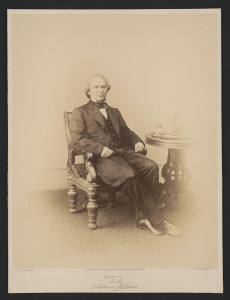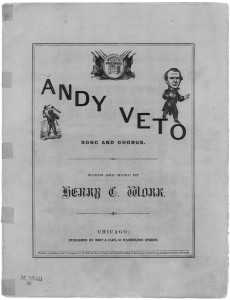
opposed to making the Bureau “a permanent branch of the public administration, with its powers greatly enlarged.”
150 years ago today President Andrew Johnson vetoed legislation that would have extended the jurisdiction of the Freedmen’s Bureau. Here is an 1896 summary. (However, the date of the veto is the 19th) From The Struggle between President Johnson and Congress over Reconstruction by Charles Ernest Chadsey:
4. The objectionable “black laws” of the Southern States, and the many tales of the oppression and cruel treatment of negroes, brought about a strong sentiment in favor of legislation by Congress giving additional protection to the freedman. The Act of March 3, 1865, had established in the War Department a “Bureau for the relief of Freedmen and Refugees,” which was “to continue during the present war of rebellion, and for one year thereafter.” This bureau was to assume control of all abandoned or confiscated lands in the insurrectionary States, and to assign tracts not to exceed forty acres each to freedmen and refugees at an annual rent of not more than six per cent. of the value. The occupants were to be allowed to purchase the land at any time within three years. The bureau was also authorized to supervise all matters that might concern freedmen and refugees from any of the rebel States or from districts occupied by the army, and to furnish supplies to such as were in need.
To extend the powers of this bureau and to continue it in operation until affairs had resumed their normal course, appeared to be a practicable way to protect the emancipated race. A bill to this effect was introduced in the Senate by Mr. Trumbull on January 5, 1866, and the Senate proceeded to its consideration on the 12th. With certain amendments the bill passed the Senate on the 25th by a vote of 37 to 10. The Select Committee on Freedmen to which the Senate bill had been referred by the House, reported on January 30 a substitute bill. This passed the House on the 6th of February by a vote of 136 to 33; it was amended by the Senate on the 7th, the House concurring on the 9th. It was vetoed by the President on the 10th, and the Senate on the 10th attempted to pass the bill over the veto. The result showed 30 votes in favor, 19 against, less than a two-thirds majority, and the bill thus failed to become a law.
The bill as presented to the President for his signature was entitled “An Act to amend an act entitled ‘An act to establish a Bureau for the relief of Freedmen and Refugees,’ and for other purposes.” It continued in force the act of March 3, 1865, and extended the jurisdiction of the bureau to freedmen and refugees in all parts of the United States. The President was authorized to “divide the section of country containing such refugees and freedmen into districts, each containing one or more States, not to exceed twelve in number, and, by and with the consent of the Senate, appoint an assistant commissioner for each of said districts;” or in the discretion of the President “the bureau might be placed under a commissioner and assistant commissioner to be detailed from the army.” Districts when necessary were divided into sub districts under agents. Military jurisdiction and protection were to extend over all connected with the bureau. Unoccupied public lands in the Southern States, not to exceed three million acres, were to be set apart for freedmen. Military protection was to be extended over all persons denied civil rights on account of race, color or previous servitude, and punishment was provided for those who deprived such parties of their civil rights.
The debates on this bill, occurring as they did before the President’s speech of February 22, which will hereafter be noticed, lacked the great bitterness which was frequently manifested in the later days of the session. The fact that the veto message was received before the 22d accounts for the failure of the attempt to override it.
The bill itself was moderate, the freedmen obviously needed the legislation, but the President considered the principles at stake of sufficient importance to justify him in further antagonizing Congress. His veto message cited a number of reasons for withholding the executive approval. In the first place he claimed that there was no immediate necessity for the measure. Then it also contained provisions which were unconstitutional and unsuited to accomplish the desired end. His chief objection, of course, was based upon the continuance of military jurisdiction into a time of peace. This he declared clearly unconstitutional, a violation of the right of habeas corpus and of trial by jury; and he added that “for the sake of a more vigorous interposition in behalf of justice we are to take the risks of the many acts of injustice that would necessarily follow from an almost countless number of agents, * * * over whose decisions there is to be no supervision or control by the federal courts. * * * The country has returned or is returning to a state of peace and industry, and the rebellion is in fact at an end. The measure, therefore, seems to be as inconsistent with the actual conditions of the country as it is at variance with the Constitution of the United States.” He considered the provisions which proposed to take away land from its former owners without due process of law, unconstitutional. Other more general objections were mentioned, such as the immense patronage created and immense expense involved, the dangerous concentration of power in the Executive, and the ethical objection that legislation which implies that the freedmen “are not expected to attain a self-sustaining condition must have a tendency injurious alike to their character and their prospects.”
The original Freedmen’s Bureau extension bill is available from the Library of Congress
You can read all of President Johnson’s veto message at Online Library of Liberty


